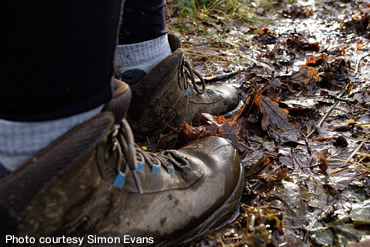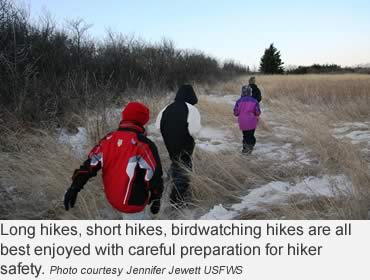Photo: Experienced hikers add a paper map and a compass to their pack as a safe backup for a cell phone map. Photo courtesy Maximillian Schiffer.
As temperatures chill, fall leaves blow away and snow arrives in colder climates, hikers of all ages are preparing to spend enjoyable hours exploring the outdoors.
All outdoor recreation—even the shortest hike—requires awareness, preparation and self-reliance. A trip into the woods on an unfamiliar trail is a great way to connect with nature, but like all outdoor activities, the most important thing to do is to prepare for your safety before you place a hiking boot on a trail.
You may think you would never get lost while hiking, but while the number of those who do get lost varies annually, around 2,000 hikers lose their way every year, according to Jason Kidd of Outdoor Pulse, a website for hikers.
The best way to make sure you don’t get lost to understand how other hikers got lost and avoid their mistakes, Kidd says. The most often way hikers become lost is by not staying on a trail. Even going a short distance off a trail makes it too easy to get turned around and lose your direction, especially in forested areas with few landmarks.
 Unexpected bad weather or a sudden storm can disorient hikers, even those who checked the forecast. Falling off a narrow trail or incurring an injury are other ways hikers get lost or isolated. And last, if you’re hiking with a group of friends, falling too far behind or getting separated from the group can result in becoming lost.
Unexpected bad weather or a sudden storm can disorient hikers, even those who checked the forecast. Falling off a narrow trail or incurring an injury are other ways hikers get lost or isolated. And last, if you’re hiking with a group of friends, falling too far behind or getting separated from the group can result in becoming lost.
New Hampshire, a state known for its beautiful White Mountains range, part of the northern Appalachian chain, is also known for its Hike Safe program and Hiker Responsibility Code.
“People hiking now must be aware of their physical limitations, rapidly changing conditions, and the unreliable cellular service in many natural and scenic locations,” says Colonel Kevin Jordan, Fish and Game Law Enforcement chief.
“Unpredictable weather, extreme temperature fluctuations, significantly reduced hours of daylight, and no electricity or wireless access means that people must be prepared with flashlights, layers of clothing that will keep them warm and dry, and accurate maps and directions.
“All hikers, regardless of experience, must know when to turn back. This is not the time of the year for dangerous backcountry adventures in rapidly changing weather conditions. It is imperative that people enjoying New Hampshire’s natural resources exercise a high degree of caution. Unsafe and irresponsible behavior puts first responders and volunteers at increased risk of injury.
 Jordan also strongly recommends that hikers be prepared and carry with them 10 essentials for changeable weather conditions and unanticipated emergencies: map, compass, warm clothing such as a hat, jacket and long pants, extra food, snacks and water, a flashlight with extra batteries or a headlamp, water and windproof matches, first aid kit, a whistle, rain jacket and pants, and a pocketknife.
Jordan also strongly recommends that hikers be prepared and carry with them 10 essentials for changeable weather conditions and unanticipated emergencies: map, compass, warm clothing such as a hat, jacket and long pants, extra food, snacks and water, a flashlight with extra batteries or a headlamp, water and windproof matches, first aid kit, a whistle, rain jacket and pants, and a pocketknife.
It’s also a good idea to follow advice from experienced hikers and include a physical map of the area you’re hiking and not solely rely on a cell phone map. Don’t forget sun protection, sunglasses or lip balm, and include a heavy-duty trash bag or a, compact space blanket for protection against cold and rain if you find you can’t continue on your trail.
Include the essentials for hiking in your pack, and should anything unexpected change your course, you’ll be prepared. Safety essentials don’t take much room in a pack and can save your life
Most importantly, before beginning a hike, let someone know where you’re going and when you expect to return. Hike safely and be knowledgeable about where you are going and what the local weather and terrain conditions will be.
Again, leave your plans with someone, and turn back if weather changes, or if your hike is taking longer than you expected and you’re losing daylight. Planning for emergencies can help you avoid them, and if you cannot avoid them, you’ll be prepared to deal with them
Even if you won’t be hiking in New Hampshire, check out the hiker advice from New Hampshire’s Fish and Game Law Enforcement Conservation officers, and learn more about their Hike Safe cards.
Looking for ae place to hike? Check the National Park Service Trails and Hiking website for information on trails near you, as well as hiking with pets and safety information.
– Resources: Outside Pulse, New Hampshire Fish & Game, National Park Service.